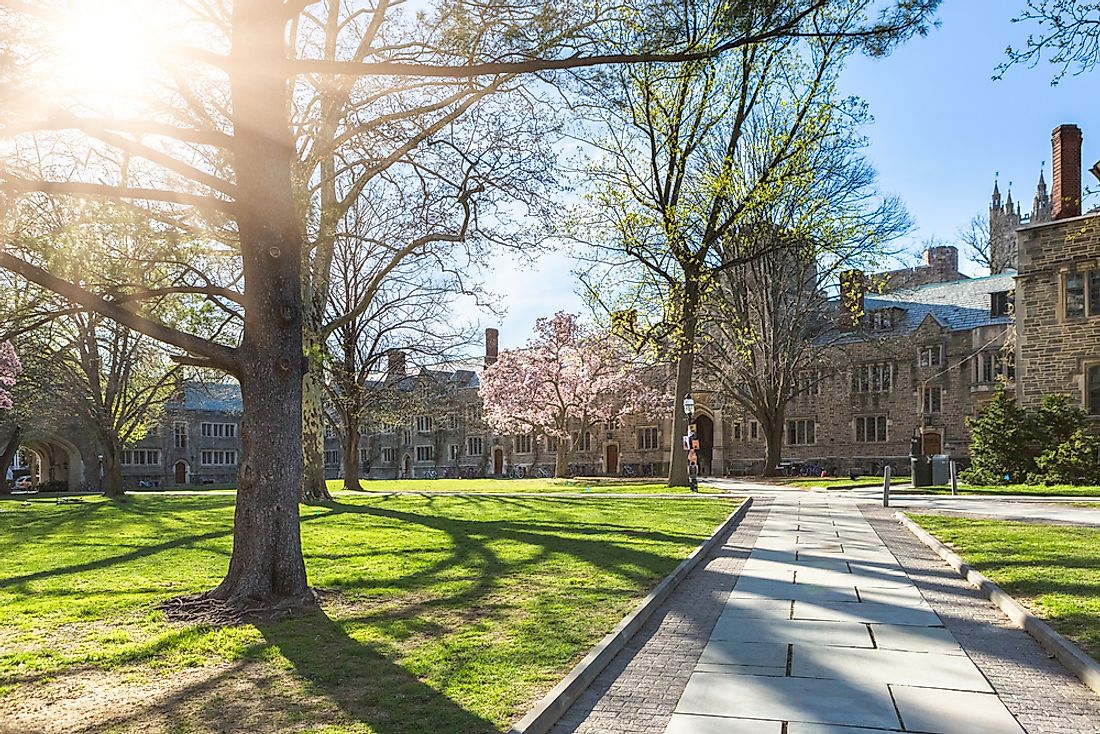Princeton University - Educational Institutions Around the World

Princeton University is found in Princeton, New Jersey, United States. It is a private university as well as a member of the Ivy League. The university provides graduate and undergraduate programs in natural science, humanities, social science, and engineering. Many notable alumni have graduated from the university.
5. Founding
Princeton University is one among the nine colonial colleges that were founded in the year 1746 in Elizabeth, New Jersey prior to the American Revolution. At its Inception, it was called the College of New Jersey. In 1747, the college relocated to Newark before moving to Princeton in 1756 and that led to the university renaming to Princeton University in 1896.
4. History
Princeton University was founded by the New Light Presbyterian in 1746 as the College of New Jersey for the purpose training ministers. The college was moved to Princeton in 1756. Princeton’s sixth president John Witherspoon changed the college from only training ministers to training young people to become leaders in the future. At this moment, academic standards were improving and there was notable investment going on in the university.
The progress of the university was interrupted by the American Revolution since Nassau Hall the building that hosted the university was occupied by the British soldiers. Nassau Hall was the sole building for Princeton University until the construction of Stanhope in 1803. After the construction of Stanhope, Nassau Hall stopped being an all-purpose building and became solely a classroom. Nassau Hall is presently an administrative center for the university.
The college had its name changed in 1896 from “College of New Jersey” to the current name Princeton University in honor of Princeton town it resides in.
3. Structure
A 40 member board makes up the trustees of Princeton University. These members are tasked to oversee the university’s growth, supervise university’s investment and approving of Capital and operating budgets.
The undergraduate degree offered by the university meets the general academic requirements. Students can either graduate with a Bachelor of Science in Engineering or graduate with a Bachelor of Arts. In the graduate school, advanced degrees in social science, engineering, natural science, and humanities are offered.
The institution adopted a grade deflation policy in the year 2004 to curb the lots of A’s that were beginning to loose meaning. That was reviewed in 2104 after an extensive consultation on its effectiveness. The university has about 2,600 students in the graduate school in 42 academic programs.
2. Rankings
For 16 years ranging from 2001 to 2016, U.S News & World Report (USNWR) ranked Princeton University either first or second among the national universities. In the most recent rankings by the U.S News, Princeton was ranked at number one and in the year 2015 and 2016 it was ranked first for “best undergraduate teaching”.
In 2016, Forbes ranked the university third among all the national universities and colleges in the “America’s Top College” rankings.
In the year 2011, Princeton University came 7th among 300 Best World Universities according to the rankings by Human Resource & Labor Review (HRLR) basing on the performance of their graduates.
1. Alumni
The university has produced notable Alumni in the U.S including two presidents of the U.S, Woodrow Wilson and James Madison. Aaron Burr, a vice president, was also a graduate from this university as was the former first lady Michele Obama. Oliver Ellsworth the former Chief Justice of the U.S graduated from Princeton University. Three the current Associate Justices of the United States’ Supreme Court,Sonia Sotomayor, Elena Kagan and Samuel Alito, are also alumni.
Apollo Astronaut also graduated from Princeton University so did the Google chairman Eric Schmidt. Lisa P. Jackson, the Environmental Protection Agency administrator, also graduated from this university.











